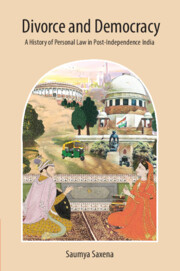Book contents
- Frontmatter
- Dedication
- Contents
- List of Figures
- Acknowledgements
- List of Abbreviations
- Introduction
- 1 Personal Law and the Making of Modern Religion, 1946–56
- 2 Committees, Codes, and Customs: Renegotiating Personal Law, 1957–69
- 3 Social Movements, National Emergency, and the Custody of the Constitution, 1967–79
- 4 Muslim Law, Hindu Nationalism, and Indian Secularisms, 1980–92
- 5 The Court in Context, 1992–2000s
- 6 From the Courtroom to the Courtyard: The Public Life of Personal Law, 2000–Present
- Conclusion
- Glossary
- Bibliography
- Index
1 - Personal Law and the Making of Modern Religion, 1946–56
Published online by Cambridge University Press: 20 May 2022
- Frontmatter
- Dedication
- Contents
- List of Figures
- Acknowledgements
- List of Abbreviations
- Introduction
- 1 Personal Law and the Making of Modern Religion, 1946–56
- 2 Committees, Codes, and Customs: Renegotiating Personal Law, 1957–69
- 3 Social Movements, National Emergency, and the Custody of the Constitution, 1967–79
- 4 Muslim Law, Hindu Nationalism, and Indian Secularisms, 1980–92
- 5 The Court in Context, 1992–2000s
- 6 From the Courtroom to the Courtyard: The Public Life of Personal Law, 2000–Present
- Conclusion
- Glossary
- Bibliography
- Index
Summary
The policy should be that marriage becomes easy and divorce difficult.
—H. V. Kamath, Lok Sabha Debates, Hindu Marriage Act, 1955The vocabulary of ‘personal law’ may indeed have been a colonial creature, but after independence it was transformed into a tool for nation-building that pieced together modern religion—through legislation. The very nomenclature of the ‘Hindu’ Code Bill or ‘Muslim’ personal law was at odds with modernity's alleged requirement of limiting the sphere of religion. Yet the ‘modern’ nation state and a ‘secular’ democracy of independent India prioritized the codification of religion as one of its foremost endeavours. In doing so, the state also acquired the power to regulate both public religion and the domestic sphere. It was only through the regulation of everyday religion that the modern nation state could expand its jurisdiction over the family in the early years of independence.
Globally, the period of the 1950s and 1960s was characterized by an engagement with family laws and personal status laws became contingent on various alliances between the new ruling classes and the religious elite. There was, in some cases—such as Malaysia—a consistent marginalization of religious law over time, since when the colonial categories of personal law code had first emerged. It was the marginalization of this legal domain of religion that began with colonialism and followed thereafter that produced the response in the form of codification of laws under civil, criminal, or religious-personal categories. This marginalization limited the domain of ‘personal law’ to merely ‘family law’ and caused representational claims and questions of ‘personal status’ to move further away from religious political thought, thus allowing for a permanent domination of the elite.
By contrast, in the Indian case, after independence, personal law became a cornerstone for Muslim politics, whereas for the Hindus, it became a tool to bring religious morality into universal statutes. The codification of religious personal law in the early years of independence acknowledged the centrality of religion in the lives of the citizens but tried to route their access to the avowedly divine laws, or essential practices of religion through institutions of the state.
Social legislation in colonial India, as in the case of the abolition of sati or child marriage, followed the logic of saving the subject from the tyranny of their own religion or custom.
- Type
- Chapter
- Information
- Divorce and DemocracyA History of Personal Law in Post-Independence India, pp. 35 - 92Publisher: Cambridge University PressPrint publication year: 2022



